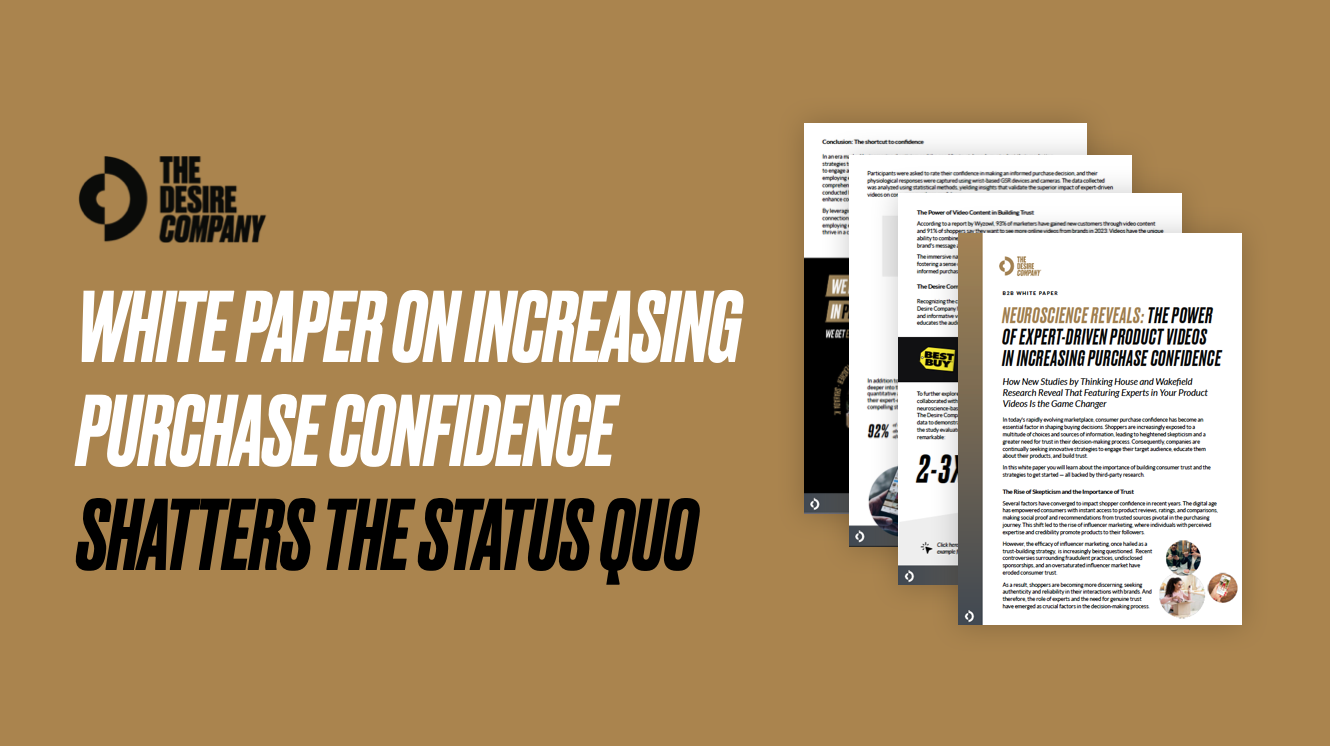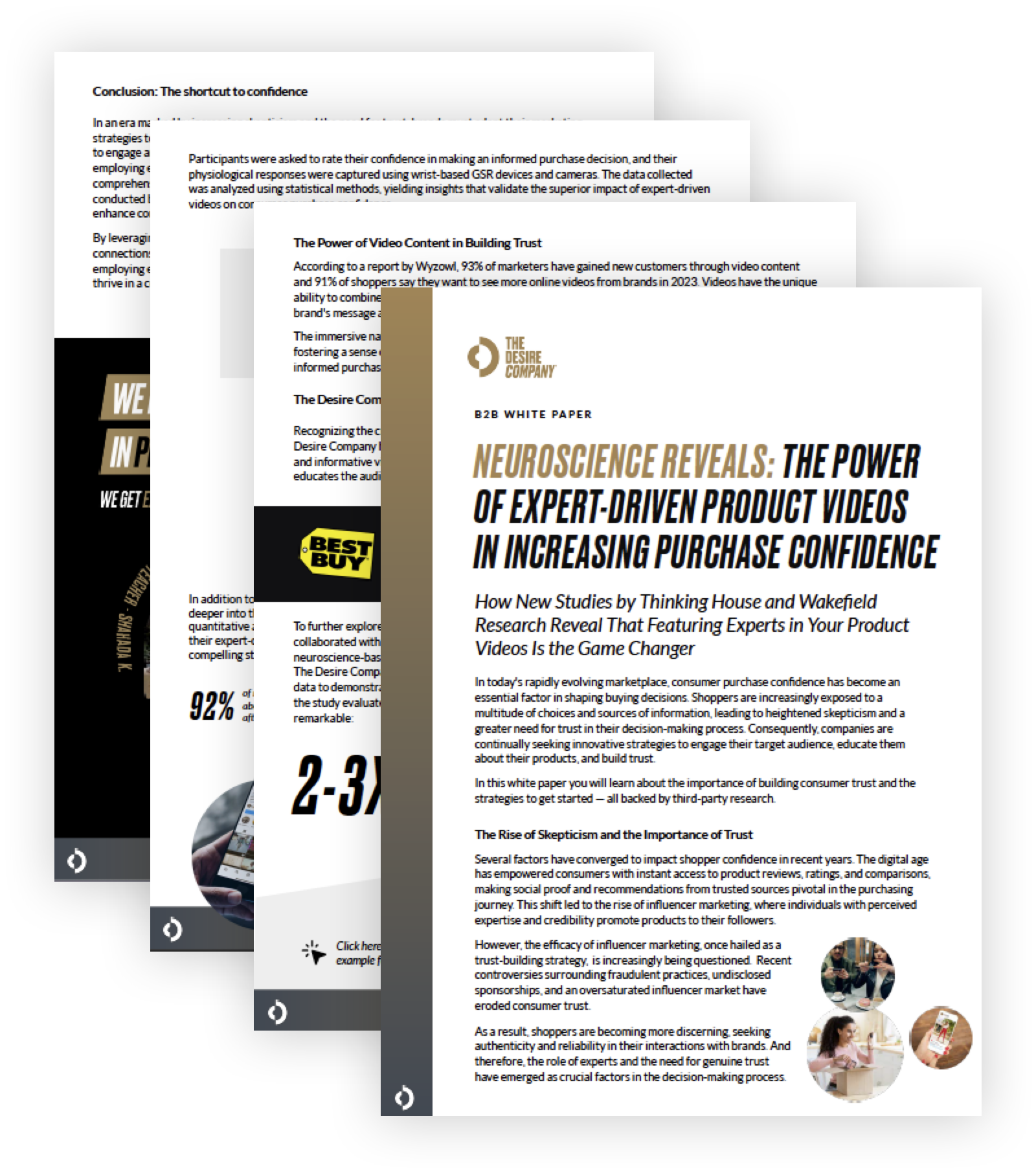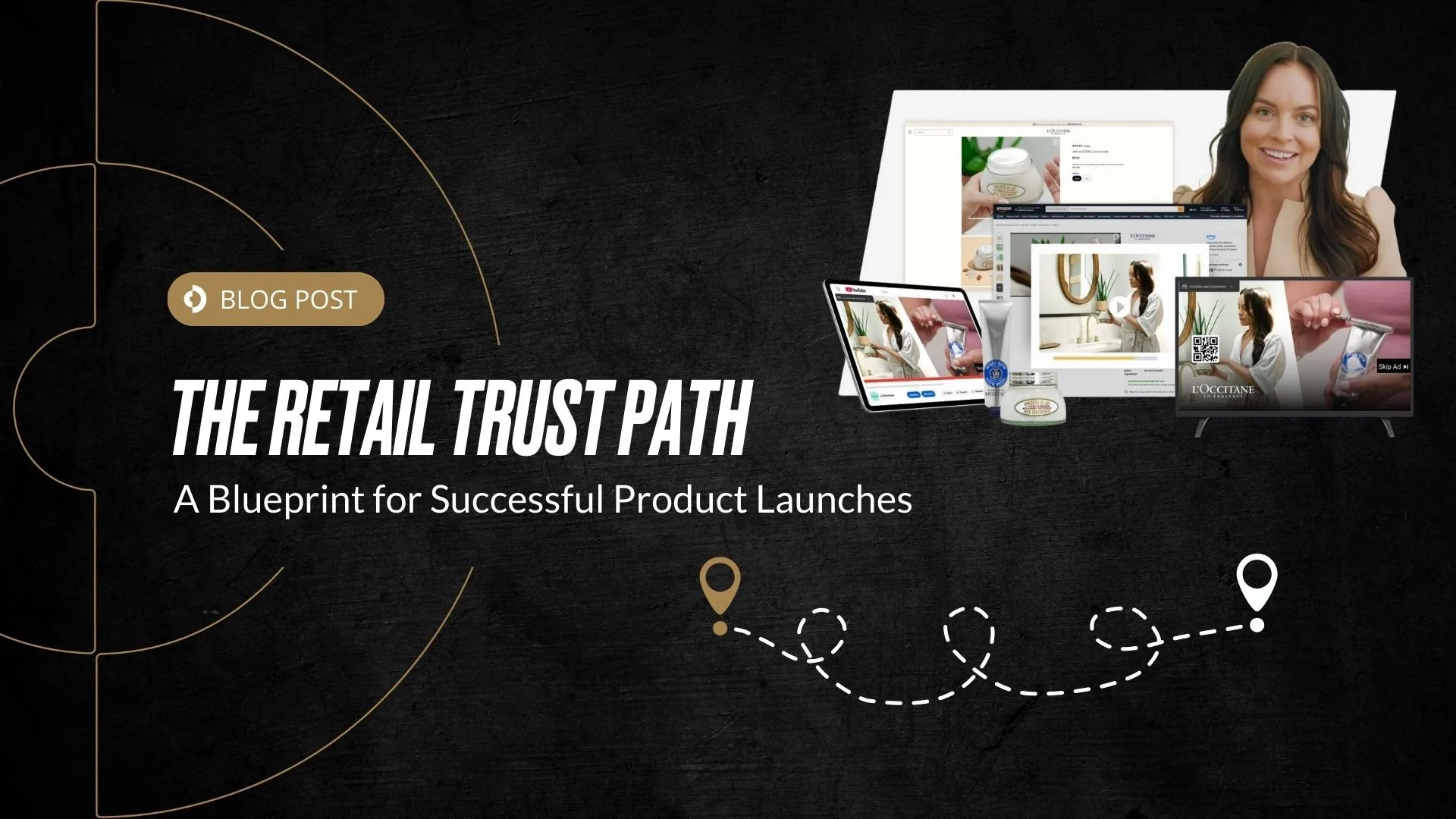Neuroscience Reveals The Power of Expert-Driven Product Videos in Increasing Purchase Confidence
New Studies by Thinking House and Wakefield Research Reveal That Featuring Experts in Your Product Videos Is the Game Changer
In today's rapidly evolving marketplace, consumer purchase confidence has become an essential factor in shaping buying decisions. Shoppers are increasingly exposed to a multitude of choices and sources of information, leading to heightened skepticism and a greater need for trust in their decision-making process. Consequently, companies are continually seeking innovative strategies to engage their target audience, educate them about their products, and build trust.
In this white paper you will learn about the importance of building consumer trust and the strategies to get started — all backed by third-party research.
Understanding Purchase Confidence: Tips for Smart Shopping Decisions
Introduction to Smart Shopping
Understanding consumer confidence and its impact on buying decisions is crucial for making informed purchases. A confident consumer feels secure in their decision-making process, supported by clear, trustworthy information. In an era dominated by digital advertising and product overload, building that confidence is more important than ever.
According to The Desire Company's white paper, "Neuroscience Reveals the Power of Expert-Driven Product Videos in Increasing Purchase Confidence," expert-led content significantly increases consumer trust and reduces uncertainty. This is particularly relevant as shoppers navigate a crowded retail environment filled with ads that often lack credibility.
Consumer trust is influenced by economic conditions, personal finances, and social proof. Researching and evaluating options—especially through expert-driven resources—can help buyers make smarter choices and reduce purchase anxiety.
Understanding Market Trends
To shop smartly, it's essential to understand broader market trends. The Consumer Confidence Index (CCI), published by The Conference Board, tracks how optimistic or pessimistic consumers are regarding their expected financial situation. The Present Situation Index and Expectations Index further break down current conditions and future expectations.
Staying informed about these trends helps consumers time purchases wisely and helps brands align messaging with consumer sentiment. When confidence is high, big-ticket purchases increase. When it’s low, consumers prioritize value and reliability—both areas where expert-led videos can help build trust.
Factors Influencing Purchase Decisions
Smart shoppers don’t rely solely on flashy ads or influencer hype. Instead, they weigh:
Personal finances and willingness to spend
Clarity around product features and benefits
The credibility of the source offering advice
According to The Desire Company, one of the biggest blockers to purchase confidence is lack of relatable, expert-backed insights. People crave product content that answers their specific questions—how it works, who it’s for, and whether it’s worth it.
Building Trust with Consumers
Trust is at the core of confident purchasing. Transparent, high-quality content helps eliminate doubts and builds rapport between brand and buyer. The neuroscience behind expert-led videos shows that seeing someone who truly knows and uses the product can significantly influence trust levels.
Consumers are more likely to buy from businesses that:
Showcase real expertise
Provide hands-on demonstrations
Foster community and shared values
When trust is broken—through misleading ads or vague claims—it can tank not only a single sale but long-term loyalty.
Effective Sales Strategies
The most effective brands employ consultative selling strategies. Instead of pushing a product, they guide the consumer to the best choice through education and empathy. Expert-driven content supports this by:
Offering real-world advice
Addressing pain points upfront
Increasing perceived value without hard selling
Brands can also boost consumer confidence by offering flexible financing options, price transparency, and clear return policies. These reduce friction and create a sense of security at checkout.
Making Informed Purchase Decisions
Smart shopping means being informed, not overwhelmed. Buyers should:
Evaluate value, quality, and long-term usability
Read trusted reviews and watch expert videos
Compare alternatives and consider return flexibility
The Desire Company’s white paper underscores the importance of educating consumers in ways that are engaging and digestible—such as expert Q&As, product demos, and walkthroughs.
Evaluating Options and Financing
Financing is often overlooked, but it plays a huge role in consumer confidence. Smart buyers:
Compare interest rates and terms
Avoid unclear or predatory financing offers
Consider long-term affordability
Brands that clearly outline payment options and provide tools like calculators or real examples build more trust. When paired with expert recommendations, financing transparency helps convert unsure browsers into confident buyers.
Consumer Expectations and Behavior
Consumers expect clarity, support, and value. Brands that understand shopper behavior—especially the need for authenticity—outperform those relying on traditional marketing. The data shows:
Shoppers trust experts more than influencers
Authenticity outperforms polish
People want answers, not just aesthetics
Aligning your product content with these expectations is a proven way to build purchase confidence and long-term brand equity.
Empathetic Support and Resources
Expert-led product content doubles as both education and empathy. It acknowledges:
The risks consumers feel when buying
Their desire to avoid regret
Their need for clarity and realness
Providing expert opinions, step-by-step guidance, and access to deeper product insights shows you care about the customer’s success—not just the sale.
Practice and Experience
As with any skill, smart shopping improves with experience. Consumers who:
Reflect on past purchases
Seek feedback from others
Stay curious and open to learning
...develop sharper judgment over time. Tools like product comparison checklists, how-to guides, and expert reviews can help accelerate this learning curve.
Overcoming Purchase Anxiety
Anxiety is one of the biggest obstacles to conversion. Brands and platforms that:
Address common concerns early
Provide peer and expert validation
Offer clear post-purchase support
...help reduce hesitation. This is where expert-driven content is especially powerful—it builds reassurance and removes uncertainty.
Staying Informed and Up-to-Date
Consumers should stay current by:
Following expert blogs, podcasts, and videos
Reading trend reports and white papers
Watching demo content on trusted platforms
This knowledge not only improves personal decision-making but helps buyers avoid manipulation by vague or misleading ads.
Avoiding Common Mistakes
Smart shoppers learn from mistakes. Common pitfalls include:
Buying based on hype
Failing to research thoroughly
Ignoring expert feedback or reviews
Avoid these by slowing down, comparing options, and listening to people who’ve actually tested the product.
Additional Tips and Reminders
Trust your gut, but back it with facts
Ask questions and seek clarity
Watch expert demos to see real-world use
Read independent reviews
Focus on needs over trends















